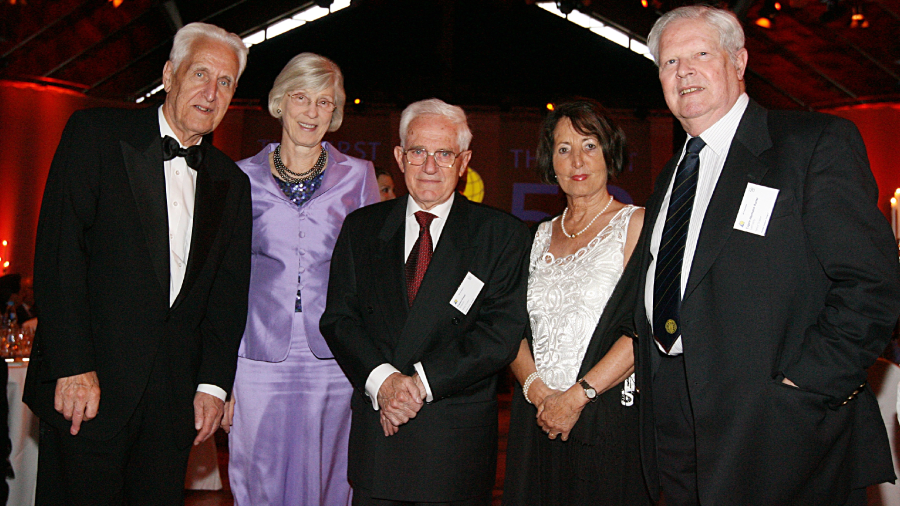AO remembers Prof Eugen Kuner, MD

Pictured from left: Siegfried Weller with his wife Karin, France Vrevc and Eugen Kuner with his wife during the Gala Dinner in the Vaillant Arena, AO Foundation Board of Trustees Meeting, fifty (50) years anniversary, Davos, June 14, 2008
The AO community this week mourns the passing of Prof Eugen Hermann Kuner, MD, 87. A founding member of AO Germany and long-time medical director of the Department of Orthopedics and Trauma Surgery at the University of Freiburg Medical Center, he died January 31, 2020, surrounded by his family. Mourners gathered for a memorial service at his home church on February 7, 2020.
Kuner was a young trauma surgeon during the period when the AO was getting started in Switzerland. Born May 3, 1932 in Lörrach, Germany, near the Swiss border, he studied medicine in Heidelberg and Freiburg im Breisgau, Germany; Basel, Switzerland; and Vienna, Austria. He continued his training at the city of Constance, Germany, with Prof Ewald Weisschedel; in Chur, Switzerland, with AO Foundation cofounder Martin Allgöwer; in Grosshöchstetten, Switzerland, with Robert Schneider; and in Freiburg, Germany, with Hermann Krauss. In 1969, he was offered the chair of the newly established Clinic for Trauma Surgery at the University of Freiburg (officially Albert-Ludwigs-Universität Freiburg), working there until 1997.
AO Trauma faculty member Felix Bonnaire described how Kuner saw early on the AO principles’ potential for transforming surgery and changing lives.
“Eugen Kuner was influenced by the culture of Baden, the humanistic Christian school, and the developing new ideas in regard to the surgical treatment of injured people by specialized surgeons,” Bonnaire explained, adding that Kuner observed firsthand the emergence of the AO, a revolutionary movement driven by Swiss orthopedic surgeons and specialists in anatomy, biomechanics, metallurgy and other disciplines. “Eugen Kuner saw very early the chances of the new movement and went to Martin Allgöwer at Chur to learn how theory and real life worked together. He saw a respectful and well-taught staff. He was impressed from seeing and knowing all of the AO’s founders personally.”
Close collaboration between the AO and Prof Hermann Krauss—then director of the university hospital in Freiburg—led to the 1961 establishment of the first AO-associated hospital outside of Switzerland, followed by the first AO courses outside of Switzerland from 1965 to 1968. Kuner became one of 22 founding fathers of the AO Germany at November 11, 1970 in Frankfurt.
“It is important to see this background to understand the professional and private life of Eugen Kuner. As a man of first hour of the AO, he felt committed to his friendship with the founding fathers of the AO to realize their principles in Germany until the end of his professional career,” Bonnaire said. “For his staff members, including myself, Eugen Kuner was a strong fighter for the AO ideals; he built up an extremely intense network between all of them: Everybody knew precisely what to do in his position. In case of trouble or poor performance, he was deeply and personally disappointed. Discussions about cases and organization were open to everybody. He led us into the world of AO by meeting the ‘great’ in the world and to scientific projects with, for example, the late Prof Stephan Perren in the AO Research Institute in Davos.”
Over the course of his career, Kuner was well-known as a pediatric trauma surgeon and as a hip surgeon in Germany. As a teacher, he was known for his extraordinary grasp of patient problems, precise planning of surgeries, extreme caution, tissue- and blood-sparing approaches, and smart reduction skills. He could not tolerate patients enduring pain, and he developed new operations on the spine and pelvis, as well as arthroscopic interventions, within his department.
During his long career, Kuner published more than 100 scientific papers and worked until 2015 on publishing books on topics that interested and moved him. The history of trauma surgery in Germany was one of his interests. With the support of AO Trauma Germany and the AO Foundation as well as the Deutsche Gesellschaft für Unfallchirurgie (DGU), he wrote a book, Vom Ende einer qualvollen Therapie im Streckverband, focusing on the end of painful traction treatment for fractures. By the time this work was published by Kaden Verlag in 2015, Kuner was already 83 years old—and still advancing the AO mission of promoting excellence in patient care and outcomes in trauma and musculoskeletal disorders.
Extremely principled and unafraid of championing unpopular ideas, Kuner was also able to laugh at himself—and is remembered as an outstanding storyteller. To his staff members, he was a trustworthy confidant and problem solver. His family, including his wife, Ursula, was his most important—and beloved—support. He is survived by his wife; children, Alexander and Susanne, both of whom are medical doctors; and grandson, as well as other family members, and friends.

